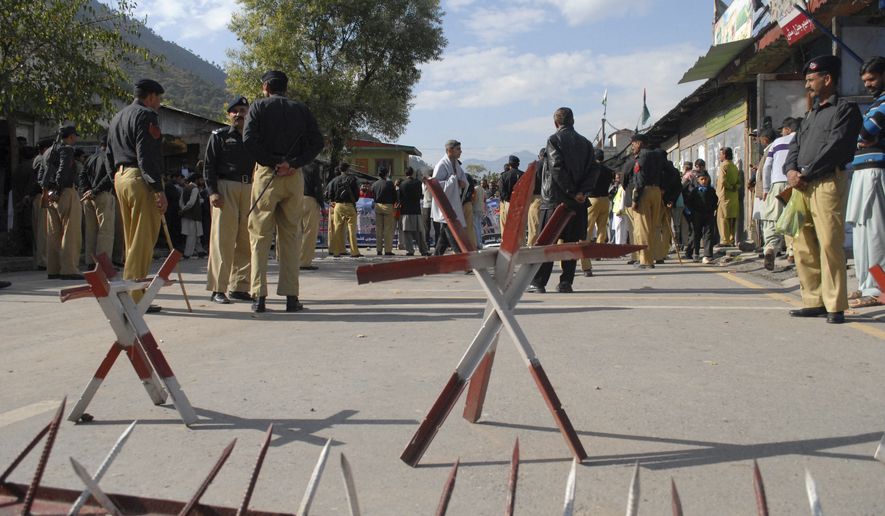Once again, Pakistanis are seething and their combustible nation threatens to erupt. Ongoing demonstrations in the capital, Islamabad, planned ones in the large commercial center of Karachi and troubles in many other parts of this economically besieged nation suggest that peace is neither reality, nor a realistic, near-term dream.
Moreover, with nuclear arms as well as delivery systems that could fall into even worse hands than the sitting national government, and having entanglements inside numerous volatile neighbors, Pakistan is actually a radio-active “powder-keg,” poised eventually to explode.
Looming trouble now in Pakistan raises serious questions.
Does any observer have confidence that an American-led coalition can restore calm within Pakistan?
If America cannot, who will?
If no nation intervenes successfully, what then?
Retreating from in front invites disaster
Created in 1947, Pakistan was problematic from the start. The independent nation presents challenges best described as “Olympian,” compared to vexing, yet trivial goals that elude America in such hotspots as Afghanistan, Iraq, Syria, Yemen, Somalia and Libya.
Bloodied since January 2009 in far less challenging territory than Pakistan, the feckless, if not reckless, Obama administration may carve out quality time to avert looming disasters — but why should reasonable observers have any confidence, at this late date, in the prowess and finesse of America’s international squad?
Like firemen rescuing one pet from a tree, instead of controlling the inferno threatening a neighborhood, President Obama and his inept team of foreign policy bunglers have steadily pushed the world towards the brink.
Should we just close our eyes and hope that following whatever damage results in the near-term, a new team will remediate and work with remaining allies to restore our prestige starting Jan. 20, 2017?
Addressing economic, political reality
Forgetting complex cultural and historical obstacles to achieving peace inside Pakistan, the overwhelming mass of that country’s population still only manages to survive in extreme economic adversity.
In 2013, according to the CIA World Factbook, some 196 million persons inside Pakistan generated economic output totaling $237 billion (using official foreign currency exchange rates), of which $192 billion was household consumption.
Adjusting for the estimate that the top 10 percent of Pakistanis accounted for 39 percent of consumption, the bottom 90 percent of Pakistanis consumed just $652 per person per year — or less than $2 per person per day.
Meanwhile, mired in simmering conflict with much larger neighbor India and enmeshed in other regional disputes, Pakistan spent an estimated 3 percent of annual economic output on its military.
Pakistan’s eastern neighbor, India, today presents a remarkably similar profile when you perform comparable calculations.
In 2013, 1.2 billion Indians generated economic output of $1.9 trillion (using official foreign currency exchange rates) and household consumption inside India was $1.0 trillion, of which 31 percent was by the top 10 percent.
Overall, the bottom 90 percent of Indians consumed $648 per person per year — an unacceptably low amount that is virtually identical to what the bottom 90 percent of Pakistanis each consumed.
Though less burdened than Pakistan, India still devoted 2.4 percent of its economic output to a sprawling military establishment.
Could a grand economic bargain between Pakistan and India, supported financially by America and other allies, provide a new foundation for lasting peace and prosperity?
If it might, is the required scale of monetary contributions worth making given how stretched western nations already are at this point?
How much is averting nuclear disaster worth?
Lost, as the West wrestles with Iran to prevent that nation’s hostile government obtaining nuclear weapons, are far more daunting near-term and strategic challenges posed by the deteriorating and fracturing nation of Pakistan.
Over decades, America has been closer to Pakistan than to India. Yet, for many reasons, relations are strained now with each of these nations.
It may always prove difficult to understand which factions are most important within Pakistan and which will most reliably work to control the worst impulses of forces there that are not natural allies of America and secular capitalism.
On the other hand, Narendra Modi has an enviable economic track record and already displays excellent impulses understanding how to combat radical, jihadist, Islamist thinking that threatens Pakistan, India, and the wider world.
Growing into his unearned accolades?
Awarded a Nobel Peace Prize in advance of meaningful foreign accomplishments, Mr. Obama may actually have an opportunity now to alter the geopolitical landscape for the manifest benefit of humanity.
Were he suddenly and unexpectedly to bring economic and political relations between Pakistan and India to new heights by greatly upping the magnitude of vetted financial support for each of these nations, the world would actually be in his debt.
Am I holding my breath?
Not so much.




Please read our comment policy before commenting.